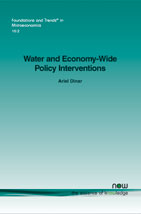Water and Economy-Wide Policy Interventions
By Ariel Dinar, Water Science and Policy Center Department of Environmental Sciences University of California, USA, ariel.dinar@ucr.edu
Abstract
Water is a limiting factor for sustainable economic growth and development in many countries. Its allocation has significant impacts on overall economic efficiency, particularly with growing physical scarcity in certain regions. Water also has become a strategic resource, involving conflicts among those who may be affected differently by various policies. This monograph reviews work that models various policy interventions aimed at improving water allocation decisions with an economy-wide context. It focuses on the "macro–micro linkage" framework that facilitates assessment of various linkages among policies and their impacts within individual sectors and the economy. Drawing on country-based studies in Morocco, South Africa, Turkey, and Mexico, the analysis reveals difficult tradeoffs among various policy objectives, including priorities placed on different sectors, regional advantages, and general economic efficiency gains versus broader social impacts. The comparison of policy impacts demonstrates how policy makers can use such information to rank the policy interventions according to the emphasis placed on their objectives. The monograph also compares approaches used in other economy-wide studies that apply computable general equilibrium models in various contexts of water, environment, and agriculture.
Water and Economy-Wide Policy Interventions
Water and Economy-Wide Policy Interventions considers policy interventions aimed at improving water allocation decisions and assessing the impact on regions and sectors by including both macro and micro considerations in a unified analytical framework. The monograph draws upon a recently completed set of country based case studies on water management policy interventions in Morocco, South Africa, Turkey and Mexico, all using a similar macro-micro CGE framework. The country studies allow, for the first time, a comparison of a variety of policy interventions across various economic, institutional and physical situations, and a generalization to situations and conditions in other countries. The results of the analyses of the macro-micro linkage approach that was applied to Morocco, Mexico, South Africa, and Turkey are presented and contrasted so that the tradeoffs between different social allocation preferences are clearly identified in terms of their impact on sectoral productivity and on welfare distribution, using economy-wide performance indicators. The authors conclude by identifying areas in need for more research – such as climate change, globalization, food crisis, migration, distributional effects – and provide a proposed framework for their inclusion in such analysis.
